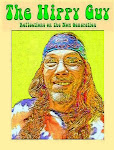
The great turning away from the illusions of the past rightfully begged the question; If what was no longer made us happy then what would? What the older generation kept asking was, in essence, "If you know of a better way, what is it?"
We didn't know.
We just knew that their way was no longer our way.
The search for happiness leads one always back to oneself. What does it take to be happy? What is happiness.
Contentment? Surely.
But contentment comes from being satisfied with what we have and who we are.
It's difficult to be content when things are disharmonious. Harmony,
then, is of great virtue. It fosters contentment, it creates happiness.
It eases suffering.
Sure, it's a highly individual matter, contentment. But the other side
of that yang is this yin, that there are things which make people happy
universally. And whether we like it or not people's happiness or unhappiness effect us all.
As for things which make us universally content, there's nothing greater than love. But love is challenging because real love means that we care as much or more for those we love than we do ourselves. Therein is the big duel that we will have with ourselves throughout our lifetime.
The thing about real love is that you have to give it to get it.
Peace gives us the right conditions for love to happen. People might go to war, say, out of some idea that they're doing so out of love, but ultimately peace generates love and love always desires peace. And either way, whether as soldiers of war or as soldiers of peace there are few things as bold as love.



